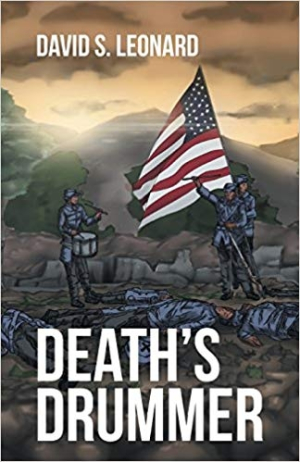Death's Drummer
A young soldier struggles to find peace and purpose in the aftermath of the American Civil War in Death’s Drummer.
The dangers and delights of hunting for gold in post-Civil War America are explored in David S. Leonard’s historical novel Death’s Drummer.
After enlisting to fight in the Civil War at only fourteen, Mark O’Kelly finds himself in his waning teens with little money, no family still standing, and ghosts of the battlefield haunting his dreams. Looking to make a fresh start, he sells the small farm he inherited from his uncle and turns his war-worn boots westward in search of new places—and people—to call home.
Along the way, Mark’s path crosses with those of frontier families, murderous bandits, an eccentric geologist, and an unexpected face from the past. He carves out a life for himself hunting for gold in the wilds of the American West, but tragedy is never far behind.
The novel, though short, sweeps through several years of Mark’s life as he moves from his late teens into early adulthood. This ambitious undertaking leads to a murky chronology. Mark’s countless wilderness journeys and temporary settlements take up unknown amounts of time. In one instance, Mark builds a cabin, is married, strikes it rich on a gold claim, and sells the plot and moves away in the span of a few paragraphs, with no hint as to how long these events took to transpire.
A revolving door of characters does little to clarify the situation, with people appearing only long enough to serve Mark’s characterization or the plot before they are murdered. Though Mark’s expressions of grief and remembrances of loved ones are frequent, the deaths grow too numerous to be felt, and the gruesome end of nearly everyone Mark encounters becomes more inevitable than climactic. The few women in the story are relegated to making bread and brewing coffee, and are specified as not beautiful but “considered pretty.” The murders of a child and pregnant woman set Mark on a quest for vengeance, but are gratuitous, and the ultimate confrontation with the grudge-carrying murderer supplies no catharsis or answers.
Neither heroes nor villains are described beyond surface details. A refreshing exception is Eskell Owens, a geologist who takes Mark under his wing, making him his apprentice and providing Mark with essential tools to ensure his future success in prospecting. Eskell’s imparted knowledge is thorough and scientific, and his gleeful chatter about copper and manganese provides a necessary splash of humor.
Grammatical and spelling errors are numerous. Quotation marks are used in an inconsistent way, confusing who is speaking and when they have stopped doing so. Regional accents are deployed, but are difficult to parse, and they are used more often on villainous characters despite their similar geographic backgrounds to their positive counterparts. The syntax of a character’s stutter makes his words impossible to decipher, and his portrayal draws on harmful stereotypes. A racial slur is also used, the instance jarring due to its singularity, however period accurate it may be.
A young soldier struggles to find peace and purpose in the aftermath of the American Civil War in the historical novel Death’s Drummer.
Reviewed by
Danielle Ballantyne
Disclosure: This article is not an endorsement, but a review. The publisher of this book provided free copies of the book and paid a small fee to have their book reviewed by a professional reviewer. Foreword Reviews and Clarion Reviews make no guarantee that the publisher will receive a positive review. Foreword Magazine, Inc. is disclosing this in accordance with the Federal Trade Commission’s 16 CFR, Part 255.

